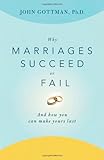 After learning about John Gottman’s research demonstrating that successful couples make five deposits into each other’s emotional bank accounts for every one withdrawal, my husband and I tried a little experiment to see if we had the right ratio. A deposit is any act of affection or kindness. Simply showing interest in what the other person is saying counts as a deposit. A withdrawal is something negative like disinterest or contempt.
After learning about John Gottman’s research demonstrating that successful couples make five deposits into each other’s emotional bank accounts for every one withdrawal, my husband and I tried a little experiment to see if we had the right ratio. A deposit is any act of affection or kindness. Simply showing interest in what the other person is saying counts as a deposit. A withdrawal is something negative like disinterest or contempt.
I found two jars: a big one to count deposits and a small one to count withdrawals. The big deposits jar was exactly four times as big as the little withdrawals jar. I know, the ratio is supposed to be five-to-one, but I couldn’t find a jar exactly five times as big as another jar, and I figured that since it is human nature to notice and remember slights more vigilantly than basic human decency, reporting error would compensate.
 For every positive interaction, we put a candy in the big jar. For every negative interaction, we put a candy in the little jar. Filling the big jar first would signal success: it would prove that we had at least four positive interactions (that we remembered and recorded) for every one negative interaction.
For every positive interaction, we put a candy in the big jar. For every negative interaction, we put a candy in the little jar. Filling the big jar first would signal success: it would prove that we had at least four positive interactions (that we remembered and recorded) for every one negative interaction.
We blew it. The little jar filled up first. We counted the candy in both jars and found that each held almost exactly the same number of candies: a one-to-one ratio of positive and negative interactions. That is not a recipe for marital bliss.
Moreover, a closer reading of Gottman’s books proves that my “reporting error” logic is a really lousy excuse; successful couples not only have a higher ratio of positive interactions, they do a better job of noticing the nice things their partners do.
 Since we failed the candy jar test, we have tried to improve at having and noticing positive interactions. Some things we have tried include writing short, daily notes of appreciation in a Couple app, having a time set aside to chat as a couple, and making sure that we first ask each other, “How was your day?” when we see each other after work, before we trudge ahead into a family logistics discussion. We have also been working to reduce the number of negative interactions by working on communication skills to prevent and de-escalate arguments. We hold a weekly meeting to discuss family logistics, budgeting and other stressful topics, so we don’t have to negotiate such things on an on-going basis all week long.
Since we failed the candy jar test, we have tried to improve at having and noticing positive interactions. Some things we have tried include writing short, daily notes of appreciation in a Couple app, having a time set aside to chat as a couple, and making sure that we first ask each other, “How was your day?” when we see each other after work, before we trudge ahead into a family logistics discussion. We have also been working to reduce the number of negative interactions by working on communication skills to prevent and de-escalate arguments. We hold a weekly meeting to discuss family logistics, budgeting and other stressful topics, so we don’t have to negotiate such things on an on-going basis all week long.
Do you have any other ideas to increase the ratio of positive interactions with those you love? What works for you?






12 Responses
I made a goal this year to write something I loved/appreciated about my husband every single day in my journal (I just keep one on the phone app DayOne). It’s helped during some hard times to still look for the good, every single day, so I have something to note! (and some days it’s really reaching to find one, as he struggles with depression and too long work hours and we may not even see each other that day). I’m going to compile and print them all out as a birthday surprise for him in December.
Writing is a great way for me to process things (hence all this blogging) and so I find that I think about compliments more when I write them. It’s a great way to feel more appreciative.
ACW that’s a really cute idea!!
We started doing (irregular but still helpful) spousal counsels based on this agenda format: 1) Share a spiritual/emotional highlight from your week. 2) Scheduling 3) Ask each other: What do you need from me this week? How can I help you with what you have going on? (so logisitics but touchy-feely) 4) Check in about the kids 5) Check in about each other — how are you doing?
I have liked this format — getting the logistics out of the way early — b/c we end up talking a lot about our lives and the kids after that stressor is gone. And it’s nice to end with a “how are you” because we have ended up confessing frustrations that we were each unintentionally keeping in. It’s something we aim to do weekly and ends up being every-3-weeks but it has helped.
(PS I would love another name other than meeting or counsel b/c a) Mormon much? and b) it ends up being much more than that! If anyone has any hints)
PPS I wish that societally we could get away from the thought of successful v unsuccessful marriages rhetoric. Glennon Doyle Melton has the philosophy that love is never wasted, and I love that. Each (safe) relationship changes you and I don’t think it’s fair to discount love for and time with someone because they aren’t married anymore. Not a critique at this post as much as of the books. I think aiming to improve things is different from viewing things as successful. Also, success connotes an ending, and we are critiquing ourselves in the midsts. Maybe giving ourselves and each other more grace in what is inevitably an intense and at times trying relationship would lend itself to more open communication within marriages and friendships about marriages.
That’s a great agenda for a sousal council.
In the books, Gottman was using the term “successful couples” as meaning “couples that do not eventually divorce” which seems reasonable to me, but I have heard people question even that. In Amy Poehler’s book, Yes Please, for example, she defends her marriage that ended in divorce as a success because it lasted for ten years: https://www.amazon.com/Yes-Please-Amy-Poehler/dp/0062268341
Every night before bed my husband and I have a scheduled what do we love about each other thing. We each say one thing that we like so it could be a complement or it could be appreciating something they did during the day. We try not to be too repetitious though of course you do end up saying something is the same.
That is nice!
Do you have a date night? And if so, are you counting several hours as one interaction? Noticing and appreciating every tiny moment will not only help you rack up those points faster, but also (I hope) increase the feeling that the other person is attentive and loving. Basically, my advice is to lower your threshold for gratitude (and reciprocation), in the hopes of starting a virtuous circle.
We go on dates about twice a month. I know that weekly is the ideal, but we have trouble finding babysitters!
And, yes, I think you are right. We need to better notice each part: we talked in the car and that was nice, we held hands during the movie, etc.
It takes courage to ask for this kind of advice. Kudos! Thanks for letting me glean off all the good ideas here!